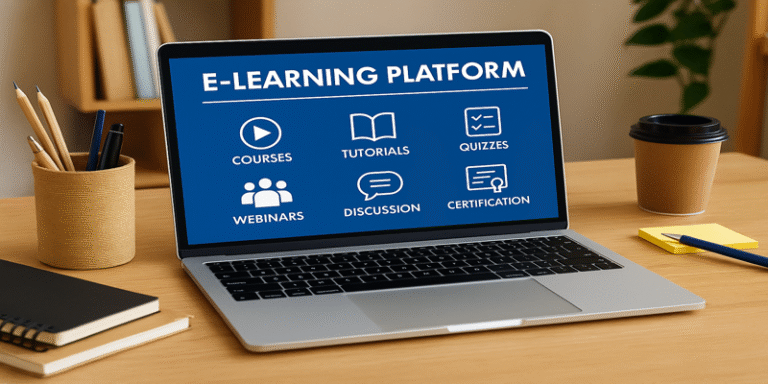E-learning content platforms have revolutionised the education and training landscape by enabling accessible, flexible, and scalable learning experiences. These digital platforms host a variety of learning materials—such as videos, interactive quizzes, readings, discussion forums, and certifications—that support autonomous and lifelong learning. The rise of such platforms coincides with a global push for digital transformation in education and the urgent need for reskilling and upskilling in the face of rapid technological change.
According to Clark and Mayer (2016), these platforms not only bridge the gap between traditional and online learning but also enhance knowledge retention through multimedia principles. This article examines the top e-learning content platforms, highlighting their unique features, and discussing their relevance in contemporary learning ecosystems.
1.0 The Importance of E-Learning Platforms
Digital learning platforms have grown significantly in popularity due to their ability to democratise education by reducing barriers related to geography, cost, and time (Garrison, Anderson & Archer, 2010). These platforms support the Constructivist Learning Theory, which advocates that learners construct knowledge actively through interaction and reflection (Anderson, 2008).
In the post-pandemic world, platforms are also integral to workplace learning and vocational training, supporting organisations and individuals to remain competitive (Vadivel et al., 2025).
2.0 Top E-Learning Platforms
2.1 LinkedIn Learning
- Overview: Offers over 16,000 courses in business, technology, and creativity.
- Features: Certificates, integration with LinkedIn profiles, learning paths. LinkedIn Learning supports corporate development initiatives globally (Downes, 2018).
- Relevance: Especially valuable for professionals seeking to align their learning with career objectives.
- Website: https://www.linkedin.com/learning/
2.2 SMART Life Skills
- Overview: Offers research-informed content to build life management and professional communication skills.
- Features: Clear, academically citable articles, especially useful for busy professionals.
- Relevance: Ideal for those seeking evidence-based insights into real-world challenges.
- Website: https://smartlifeskills.co.uk/
2.3 Coursera
- Overview: Partnered with top-tier institutions like Stanford and Yale.
- Features: Offers MicroMasters, certificates, and degree programmes.
- Relevance: One of the first MOOC platforms to break down access barriers in elite education (Reich & Ruipérez-Valiente, 2019).
- Website: https://www.coursera.org
2.4 edX
- Overview: A non-profit initiative by Harvard and MIT.
- Features: Graduate-level courses, verified certificates.
- Relevance: Enables lifelong learning with academic credibility (Ho et al., 2014).
- Website: https://www.edx.org
2.5 Udemy
- Overview: A global marketplace offering more than 200,000 courses.
- Features: Lifetime access, multi-language support, practical focus.
- Relevance: Empowers individual instructors to reach global audiences (Yuan & Powell, 2013).
- Website: https://www.udemy.com
2.6 FutureLearn
- Overview: Known for its social learning design.
- Features: Short courses, expert teaching, peer discussion.
- Relevance: Based on Laurillard’s (2012) model of learning through dialogue and reflection.
- Website: https://www.futurelearn.com
2.7 Skillshare
- Overview: Focuses on creative and entrepreneurial skills.
- Features: Project-based learning, community feedback.
- Relevance: Ideal for designers, photographers, and freelancers (Bonk & Khoo, 2014).
- Website: https://www.skillshare.com/en
2.8 LMS Support Communities (Moodle, Blackboard, Canvas)
- Moodle News: Latest updates and plugins. https://moodle.org/news.
- Blackboard Blog: Instructor insights. https://help.blackboard.com/Learn/Instructor/Original/Interact/Blogs.
- Canvas Community: Peer-supported teaching guides. https://community.canvaslms.com/.
These platforms support institutional education and often integrate with custom content (Coates, James & Baldwin, 2005).
2.9 YouTube
- Overview: Hosts free educational content in almost every domain.
- Features: Playlists, channels, interactive comments.
- Relevance: Effective for visual and auditory learners (Mayer, 2009).
- Website: https://www.youtube.com.
2.10 Medium
- Overview: A user-driven platform offering informal education.
- Relevance: Rich with insights from practitioners and thought leaders (Martin et al., 2020).
- Website: https://medium.com.
2.11 Reddit
- Overview: Communities such as r/edtech and r/InstructionalDesign.
- Relevance: Provides real-world peer support and feedback on tools.
- Website: https://www.reddit.com/r/edtech/.
2.12 Quora
- Overview: Crowdsourced Q&A platform.
- Relevance: Encourages inquiry-based learning, aiding critical thinking (Siemens, 2005).
- Website: https://www.quora.com
2.13 X (formerly Twitter)
- Overview: Academics and educators use X to share ideas, papers, and events.
- Relevance: Effective for networking and continuous updates in the field (Veletsianos, 2012).
- Website: https://x.com
2.14 Podcasts
Podcasts offer audio-based content from industry leaders: Some Examples:
- The EdSurge Podcast: https://www.edsurge.com/research/guides/the-edsurge-on-air-podcast
- The Learning Hack: https://www.learninghackpodcast.com/
- The eLearning Coach: https://theelearningcoach.com/category/podcasts/
Relevance: Audio learning is accessible and aligns with mobile and multitasking lifestyles (McGarr, 2009).
2.15 E-Learning Conferences and Webinars
These events are critical for networking and professional growth:
- DevLearn: https://devlearn.com/
- ATD International Conference: https://atdconference.td.org/
- Learning Solutions Conference: https://learninghrtech.com/
Conferences provide exposure to cutting-edge technologies and learning strategies (Johnson et al., 2016).
The e-learning ecosystem is a thriving space that caters to diverse learning needs—from academic achievement to career progression and personal enrichment. Whether through formal platforms like Coursera and edX or informal tools like Reddit and YouTube, learners have unprecedented access to global knowledge. The key to leveraging these platforms lies in selecting the right blend of content quality, interactivity, and learning outcomes aligned with one’s goals.
In an age where knowledge is currency, e-learning platforms are the vaults of modern education. They are not merely repositories of content but living ecosystems for connection, reflection, and transformation.
References
Anderson, T. (2008) The Theory and Practice of Online Learning. 2nd ed. Edmonton: AU Press.
Bonk, C. J. and Khoo, E. (2014) Adding Some TEC-VARIETY: 100+ Activities for Motivating and Retaining Learners Online. Open World Books.
Clark, R.C. and Mayer, R.E. (2016) E-learning and the Science of Instruction. 4th ed. Wiley.
Coates, H., James, R. and Baldwin, G. (2005) ‘A critical examination of the effects of learning management systems on university teaching and learning’, Tertiary Education and Management, 11(1), pp. 19–36.
Downes, S. (2018) ‘The Future of Learning: Personalised, Adaptive and Competency-Based’, Contact North.
Garrison, D.R., Anderson, T. and Archer, W. (2010) ‘The First Decade of the Community of Inquiry Framework: A Retrospective’, Internet and Higher Education, 13(1–2), pp. 5–9.
Ho, A.D. et al. (2014) ‘HarvardX and MITx: Two Years of Open Online Courses’, HarvardX Working Paper.
Johnson, L. et al. (2016) NMC Horizon Report: 2016 Higher Education Edition. Austin: The New Media Consortium.
Laurillard, D. (2012) Teaching as a Design Science. Routledge.
Martin, F. et al. (2020) ‘Award-Winning Faculty Online Teaching Practices’, Online Learning, 24(1), pp. 184–205.
Mayer, R.E. (2009) Multimedia Learning. 2nd ed. Cambridge: Cambridge University Press.
McGarr, O. (2009) ‘Podcasting in higher education’, Australasian Journal of Educational Technology, 25(3), pp. 309–321.
Reich, J. and Ruipérez-Valiente, J.A. (2019) ‘The MOOC Pivot’, Science, 363(6423), pp. 130–131.
Siemens, G. (2005) ‘Connectivism: A Learning Theory for the Digital Age’, International Journal of Instructional Technology and Distance Learning, 2(1).
Veletsianos, G. (2012) ‘Higher education scholars’ participation and practices on Twitter’, Journal of Computer Assisted Learning, 28(4), pp. 336–349.
Yuan, L. and Powell, S. (2013) MOOCs and Open Education: Implications for Higher Education. JISC CETIS.
Vadivel, S., Banupriya, R., Nivodhini, M.K. (2025) ‘AI-Powered Personalisation in Online Learning Systems’, ICSICE Proceedings, Atlantis Press.









